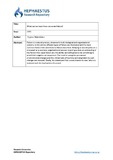| dc.contributor.author | Makridakis, Spyros | |
| dc.date.accessioned | 2015-12-15T08:51:00Z | |
| dc.date.available | 2015-12-15T08:51:00Z | |
| dc.date.issued | 1991 | |
| dc.identifier.issn | 0024-6301 | |
| dc.identifier.uri | http://hdl.handle.net/11728/6640 | |
| dc.description.abstract | Failure is a natural process, observed in both biological and organizational systems. In this article different types of failure are illustrated and the most common factors that contribute to failure described. Delaying or avoiding failure is discussed as a conscious organizational process requiring a clear understanding of the factors that cause failure and the ability and willingness to do something to avoid their negative consequences. The need to recognize permanent environmental changes and the critical tasks of learning and adaptation to such changes are stressed. Finally, the statement that success breeds its own failure is explored and the implications discussed. | en_UK |
| dc.language.iso | en | en_UK |
| dc.publisher | Elsevier | en_UK |
| dc.relation.ispartofseries | Long Range Planning;Volume 24, Issue 4 | |
| dc.rights | © 1991 Published by Elsevier Ltd. | en_UK |
| dc.rights.uri | http://creativecommons.org/licenses/by-nc-nd/4.0/ | en_UK |
| dc.subject | Research Subject Categories::SOCIAL SCIENCES::Business and economics | en_UK |
| dc.title | What can we learn from corporate failure? | en_UK |
| dc.type | Article | en_UK |
| dc.doi | 10.1016/0024-6301(91)90012-D | |


